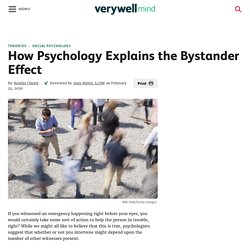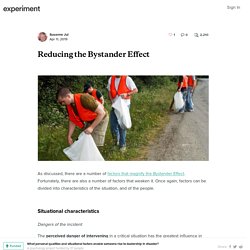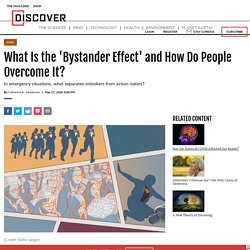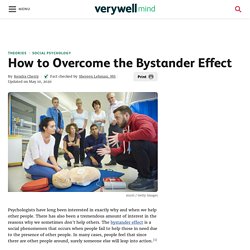

Being part of a large crowd makes it so no single person has to take responsibility for an action or inaction.
According to verywellmind, there are two major factors that contribute to the bystander effect. First, the presence of other people creates a diffusion of responsibility. Because there are other observers, individuals do not feel as much pressure to take action. The responsibility to act is thought to be shared among all of those present.
(127) The Bystander Effect: Why Some People Act and Others Don't. The Science of Empathy. The bystander effect is complicated. Bystander Effect. How to be kinder to strangers in Singapore, Opinion News. The Charities Aid Foundation recently released the World Giving Index 2017, which provides insight into the scope and nature of giving around the world. Based on data collected from the Gallup World Poll, the index, which polled 1,000 individuals in each representative country, revealed two surprising facts. Myanmar, Indonesia and Kenya turned out to be among the most charitable countries, even though they have a huge number of their populations living below the poverty line.
Being poor does not stop one from being generous. Wealthy countries such as the United States, Canada, New Zealand, Australia and the United Arab Emirates also feature in the top 10. Myanmar, the top country for four years in a row, has a poor human rights record, in part because of its treatment of the Rohingya Muslims. Singapore, ranked 30, is behind Indonesia (2), Myanmar (1) and Thailand (15), but streets ahead of Cambodia (134), Vietnam (116) and the Philippines (54) in Asean. Changing our mindset. What Is the Bystander Effect? If you witnessed an emergency happening right before your eyes, you would certainly take some sort of action to help the person in trouble, right?

While we might all like to believe that this is true, psychologists suggest that whether or not you intervene might depend upon the number of other witnesses present. What Is the Bystander Effect? The Bystander Effect - You Can Break the Cycle. Reducing the Bystander Effect. As discussed, there are a number of factors that magnify the Bystander Effect.

Fortunately, there are also a number of factors that weaken it. Bystander effect - Diffusion of responsibility. What Is the 'Bystander Effect' and How Do People Overcome It? This story appeared in the June 2020 issue as "Action!

" Subscribe to Discover magazine for more stories like this. On April 9, 2017, three security officers from the Chicago Department of Aviation forcibly removed David Dao from an overbooked United Airlines flight. Dao, a 69-year-old doctor, was dragged down the plane’s aisle after he refused to give up his seat. In the process, his head hit an armrest and he was knocked unconscious. The passengers clearly recognized what was occurring: Many took out their phones and filmed the scene and later expressed their outrage loudly on social media. At some level, this is hardly surprising. However, this is not a hard-and-fast rule; sometimes people in groups are able to break out of the bystander role. Psychologists call those who display moral courage and choose to do something rather than watch in silence moral rebels.
Specialized Skills If you act, will it matter? (Credit: Kellie Jaeger) Confidence Is Key Lives at Stake Bigger, Better Brains? Overcoming the Bystander Effect. How to Overcome the Bystander Effect. Psychologists have long been interested in exactly why and when we help other people.

There has also been a tremendous amount of interest in the reasons why we sometimes don't help others. The bystander effect is a social phenomenon that occurs when people fail to help those in need due to the presence of other people. In many cases, people feel that since there are other people around, surely someone else will leap into action.1 While the bystander effect can have a negative impact on prosocial behavior, altruism and heroism, researchers have identified a number of different factors that can help people overcome this tendency and increase the likelihood that they will engage in helping behaviors.2 Some of these include: Witnessing Helping Behavior Sometimes just seeing other people doing something kind or helpful makes us more willing to help others.
Imagine that you are walking into a large department store. Being Observant Being Skilled and Knowledgeable Guilt Feeling Good. 10 Notorious Cases of the Bystander Effect. Bystander Apathy Experiment - The Case of Kitty Genovese Explained. THE BYSTANDER EFFECT. Is the Bystander Effect Real?